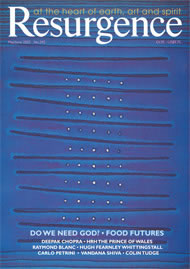FOOD IS OUR “most profound engagement with the natural world”, says author and naturalist Michael Pollan. His new book is an expansive and scientific view of the industrialised food industry in the US and is meticulously researched. The result is a sharp-edged critique of the ethics and ecology of eating. The author’s silken prose and enjoyment of his culinary adventure have earned him well-deserved praise. Nevertheless, the reader should prepare for the harsh realities of agribusiness, hunting and even family farming practices. Pollan leads us along an intriguing journey: one that connects complex paths through the spiritual, social, political, economic and biological relationships of nutrients – from soil to table.
The narrative relates the fascinating natural history of the origin of four meals, from living organism to (at times) inedible, over-produced ‘food’. Pollan begins his account in the Iowa cornfields, and from there to the feedlots, food-science laboratories, and on to the fast-food restaurants of America. His first meal is the most commonly consumed in America: ‘fast food’. Pollan and his family gobble down a McDonald’s lunch chock-full of corn products. Next, Pollan prepares dinner with goods purchased at America’s fabulously successful ‘organic’ Whole Foods Market. Some of his harshest criticism is reserved for the failures of “big organic” represented by the Whole Foods Market delivery system. Pollan then cooks a meal with ingredients from a small, utopian Virginia farm. Finally, he shares his passion for a feast of wild food for which he has personally foraged and hunted.
The villain of the book is corn and the unprecedented success of this plant genus. Corn is the ‘keystone species’ of the industrial food chain that feeds most Americans. Thirteen of the thirty-eight ingredients that make a Chicken McNuggett are derived from corn. High-fructose corn syrup is hidden in breakfast cereal, bread, fruit juice and health food, resulting in Americans eating about forty pounds of corn byproducts every year. These over-manufactured and widely transported ‘empty calories’ are available at low-income convenience stores, while fresh vegetables, fruit, meat and fish are out of reach financially and geographically to the poorest American.
Most reproachable is that this “plague of corn”, subsidised by all kinds of tariff and trade agreement, leads directly to the scandal of obesity in America, but this fact is obfuscated by the media, the government and agribusiness.
While an exposé of industrial agribusiness, Pollan’s book is a passionate exploration of gastronomy in America. Gastronomy is a holistic scrutiny of food production, a transdisciplinary study of the relationship between food and culture. Gastronomy is to food, eating and health as Deep Ecology is to the health of our living environment. Pollan says “what we are eating is never anything more or less than the body of the world.” The Omnivore’s Dilemma reawakens the reader’s consciousness of eating.







